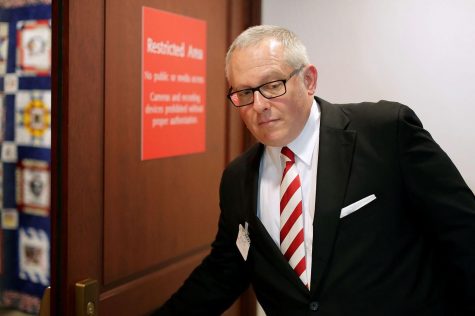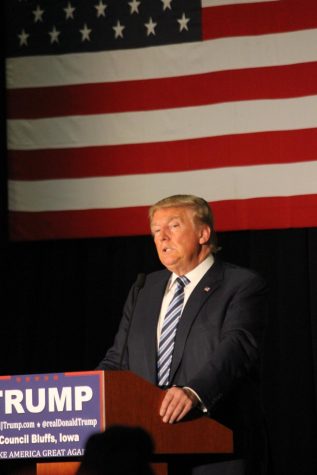Endorsements Promote Democratic Party Unity
Endorsements from former candidates have been a hot topic in the Democratic primaries. (Courtesy of Flickr)
March 25, 2020
From what we have seen of the primaries, it is becoming clearer by the day as to who this election has come down to in terms of Democratic hopefuls vying to win the presidency: former Vice President Joe Biden. After the events of Super Tuesday, which saw campaigns dropping out of the race to make room for our present presidential contenders, one word has risen from what has been left behind of now-defunct presidential campaigns: endorsements.
From a historical standpoint, endorsements have served as a means to convey that although now absent from the running, the power a defeated candidate holds to influence the nation has not been diminished. Whether a candidate is surging in the polls or plummeting precariously to a nadir of nowhere, one thing must always be maintained in absolute reverence: the fate of an American presidential election should always be held in the interest of America’s populace. Indiscriminate of the reasons a former candidate chooses to endorse their candidate of choice, their individual interests are never to precede the interests of America’s denizens. No matter when a presidential election is to occur and no matter what policies may be up for contention, it is ultimately the interests of the nation that take center stage on the debate stage, and even in the White House.
Following Super Tuesday, Biden has not only found his campaign rejuvenated, but has seen himself become the recipient of a slew of campaign endorsements. Such endorsements include Sen. Amy Klobuchar, Sen. Kirsten Gillibrand, former South Bend Mayor Pete Buttigieg, Rep. Tulsi Gabbard, Sen. Cory Booker and even former New York City Mayor Michael Bloomberg, who has spent a prolific amount of money to finance his own campaign and disperse campaign ads. In fact, it was Klobuchar’s endorsement of Biden that is being credited for his boost in Minnesota. This also contributes to campaign endorsements carrying significant weight in the long run as well. Minnesota now seems inclined to view Biden as favorable simply because a Minnesota senator endorsed him. The prospects that the state views Biden as favorable in the future, should he be up for reelection upon initially winning the presidency, are significantly higher.
However, one candidate has yet to say whom she will endorse: Sen. Elizabeth Warren. Even if she chooses to elevate herself from her political dormancy, the decision as to whom to support should not be a topic of much conflict. As many Americans are aware, a common theme that has enveloped the Democratic Party’s desire to win the White House in 2020 is defeating President Donald Trump. Super Tuesday served as a signal that helped reveal who is viewed most favorably to complete such an objective: Biden. Raking up the most endorsements from former candidates, it is only sensible for Warren to follow in the footsteps of her fellow Democrats and maintain the unity of the party by backing Biden. At this junction, it would be rather unwise if Warren made these two decisions: endorsing no one or endorsing Sen. Bernie Sanders. If Warren were to endorse Sanders, she would essentially be viewed as an outlier to the rest of the Democratic Party, as she would choose to break from the party’s homogeneously-accepted move of endorsing Biden. This failure to unify the Democratic Party would threaten the party’s prospects of beating Trump. The same could be said if she chose to endorse no one. Either way, without an endorsement from Warren, and a desired one at that, the Democrats face a lose-lose situation. Warren’s endorsement should become something of an urgency for the Democratic Party and the Democratic cause to replace Trump.
Such a thought is a rather convenient transition to the fact that Marianne Williamson, an American author and politician, views Biden’s copious amounts of endorsements as a “coup” of sorts to conspire against Sanders. She goes as far as arguing that Democrats felt inclined to unify around Biden because they fear the inconvenience a Sanders presidency would pose to the establishment or top 1%. Such a statement is rather disconcerting, as a presidential election should not be addressed from the scope of the top 1%, but from the standards held by the American people. If America sets a precedent that elections revolve around the establishment and not the intuition of the people, democracy may as well be declared dead.
The power vested in the endorsements of former candidates should not be viewed from a perspective of how they better the interests of the establishment, or as a conspiracy to harm another candidate who is less preferable to a party than another, but should be used to bridge the ever-so-clear gaps in American solidarity among party lines. Instead of trying to weaponize the concept of endorsements during the 2020 election, Americans should try using the concept to bring unity to the nation. Endorsements from former candidates should not be viewed as a means to obstruct or eviscerate another campaign. Rather, they should be viewed as instrumental in fortifying unity among political parties and strengthening the resolve of American solidarity for the 2020 election, as well as elections of the future.
Noah Osborne, FCRH ’23, is a journalism major from Harlem, N.Y.











If you want a picture to show with your comment, go get a gravatar.